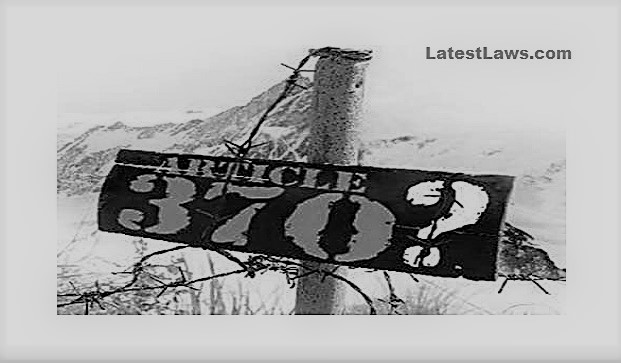September 22, 2018:
Petitioner has sought a declaration from Supreme Court that separate Constitution of Jammu and Kashmir was "Arbitrary" and "Unconstitutional."
PIL has been filed in the Supreme Court challenging the constitutional validity of Article 370 of Constitution, which grants special status to Jammu and Kashmir and limits the Parliament's power to make laws concerning the State.
Plea has stated that special provision was "temporary" in nature at time of framing of Constitution and Article 370(3) lapsed with dissolution of Jammu and Kashmir Constituent Assembly on January 26, 1957.
Plea, filed by Delhi BJP leader and Advocate Ashwini Kumar Upadhyay, has also sought a declaration from Supreme Court that separate Constitution of Jammu and Kashmir was "arbitrary" and "unconstitutional" on grounds, including that it was against "supremacy of Constitution of India and contrary to dictum of 'One Nation, One Constitution, One National Anthem and One National Flag'".
Petition further states that,"The Constitution of Jammu and Kashmir is invalid mainly for the reason that the same has not yet got the assent of the President, which is mandatory as per provisions of the Constitution of India".
Petition may come up for hearing next week.
Petition claims that maximum life span of Article 370 was only till existence of Constituent Assembly, that was January 26, 1950 when national document was adopted.
Article 370 is a "temporary provision" with respect to Jammu and Kashmir and restricts the applicability of various provisions of the Constitution by "curtailing" the power of Parliament to make laws on subjects which fall under the Union and Concurrent lists.
Read Text of Article 370 of Constitution of India-
Article 370. Temporary provisions with respect to the State of Jammu and Kashmir.
1[370. Temporary provisions with respect to the State of Jammu and Kashmir.
(1) Notwithstanding anything in this Constitution, –
(a) The provisions of article 238 shall not apply in relation to the State of Jammu and Kashmir;
(b) The power of Parliament to make laws for the said State shall be limited to-
(i) Those matters in the Union List and the Concurrent List which, in consultation with the Government of the State, are declared by the President to correspond to matters specified in the Instrument of Accession governing the accession of the State to the Dominion of India as the matters with respect to which the Dominion Legislature may make laws for that State; and
(ii) Such other matters in the said Lists as, with the concurrence of the Government of the State, the President may by order specify.
Explanation. For the purposes of this article, the Government of the State means the person for the time being recognised by the President as the Maharaja of Jammu and Kashmir acting on the advice of the Council of Ministers for the time being in office under the Maharaja’s Proclamation dated the fifth day of March, 1948;
(c) The provisions of article 1 and of this article shall apply in relation to that State;
(d) Such of the other provisions of this Constitution shall apply in relation to that State subject to such exceptions and modifications as the President may by order 1specify:
Provided that no such order, which relates to the matters specified in the Instrument of Accession of the State referred to in paragraph (i) of sub-clause (b) shall be issued except in consultation with the Government of the State:
Provided further that no such order, which relates to matters other than those referred to in the last preceding proviso shall be issued except with the concurrence of that Government.
(2) If the concurrence of the Government of the State referred to in paragraph (ii) of sub-clause (b) of clause (1) or in the second proviso to sub-clause (d) of that clause be given before the Constituent Assembly for the purpose of framing the Constitution of the State is convened, it shall be placed before such Assembly for such decision as it may take thereon.
(3) Notwithstanding anything in the foregoing provisions of this article, the President may, by public notification, declare that this article shall cease to be operative or shall be operative only with such exceptions and modifications and from such date as he may specify:
Provided that the recommendation of the Constituent Assembly of the State referred to in clause (2) shall be necessary before the President issues such a notification.]
1. In exercise of the powers conferred by this article the President, on the recommendation of the Constituent Assembly of the State of Jammu and Kashmir, declared that, as from the 17th day of November, 1952, the said article 370 shall be operative with the modification that for the Explanation in clause (1) thereof, the following Explanation is substituted namely:-
Explanation-
For the purposes of this article, the Government of the State means the person for the time being recognised by the President on the recommendation of the Legislative Assembly of the State as the “Sadar-i-Rayasat of Jammu and Kashmir, acting on the advice of the Council of Ministers of the State for the time being in office.”
Picture Source :

























